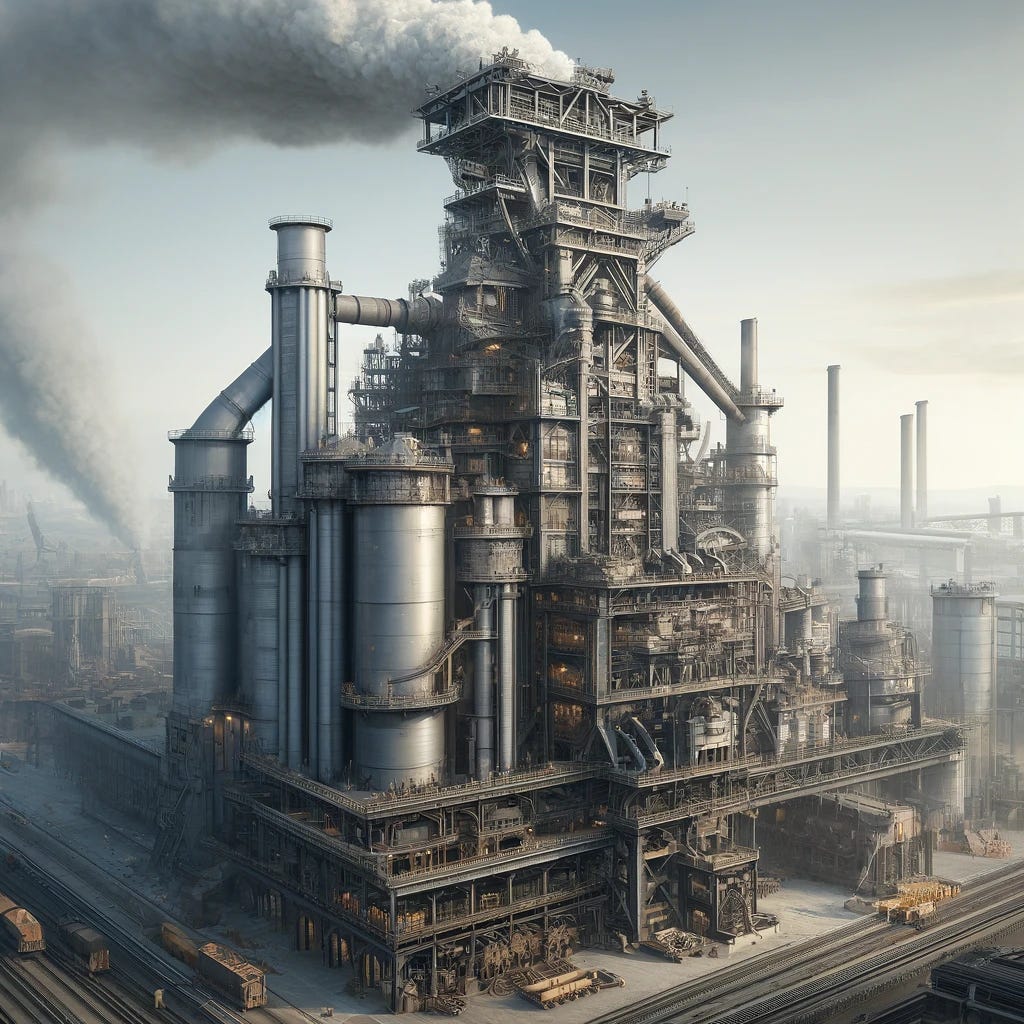Metallurgical coal is coming to the end of the road
Green steel is cheaper once carbon emissions are taken into account
It’s long been the case that when the costs of carbon dioxide and particulate emissions are taken into account, coal-fired electricity generation, from new or existing plants, is costlier than carbon-free sources such as solar PV and wind.
Until recently, however, metallurgical coal, used in blast furnaces for the production of steel has appeared as an exception. Steel can be recycled in electric arc furnaces but the blast furnace process was the only cost-effective way of producing new steel.
The most important alternative to blast furnaces is direct reduction of iron (DRI) using hydrogen. Hydrogen combines with the oxygen in iron ore leaving metallic iron which can be fed into an electric arc furnace. When hydrogen is generated by electrolysis, and carbon-free sources of electricity are used throughout the process, emissions are reduced nearly to zero. The resulting product is referred to as ‘green steel’.
Serious efforts to produce green steel began with the Hybrit pilot plant in Sweden, which first produced steel in 2021. A large number of projects are now underway with the most advanced being the H2 plant, a $US6 billion project now under construction in Sweden. H2 aims to produce 5 million tonnes of green steel annually by 2030. H2 estimates its production cost at $US 325/tonne, a premium of 25 per cent or $US65 compared to blast furnace steel.
The value of CO2 emissions avoided may be estimated using the price of $US51 used in policy evaluation in the US. This is consistent with the price of $A70 recently announced for use in Australia by the AEMC.
Each tonne of steel produced using blast furnace technology results in the emission of 1.7 to 1.8 tonnes of carbon dioxide, compared to around 0.1 tonnes for green steel. This implies a cost of around $US80/tonne for excess emissions generated by blast furnaces, an amount that exceeds the cost premium for green steel. This gap will grow over time as the carbon price increases and the cost of green steel production (in particular, the cost of green hydrogen) declines.
This calculation excludes the methane emissions associated with the extraction of coal, which are also substantial in many cases,
It follows that, taking carbon emissions into account and using the carbon prices currently employed in policy analysis in the US and Australia, blast furnace steel production using metallurgical coal should be phased out in favour of green steel.
Read my newsletter




The investors in H2 can sleep pretty easily. They can look forward to the EU turning its shadow carbon price into a real one in a year or two through carbon border taxes. Since Australia and the USA have already conceded the principle through their domestic shadow carbon prices, they will hardly be able to object at the WTO. If that fails, the Commission has already waved through a massive subsidy from the German government to ThyssenKrupp's green steelworks in the Ruhr, and the Swedish government will fight for equal treatment. In addition, HYBRIT has already sold early batches of green steel from its pilot plant to Volvo Cars and other customers willing to pay a premium for green bragging rights. There is a ready market awaiting.
A minor but intriguing factor is steel quality. Before the Industrial Revolution, iron had been smelted for 1500 years with charcoal, virtually pure biomass carbon. The ironmasters in England ran out of forests to burn and were forced to switch to coal, abundant but awash in contaminants. Quality went down. DRI ironmaking goes back to the future. Sweden has a nice little niche in top-quality steel for surgical instruments, implants, machine tools etc., and DRI will help keep it.
Sweden has a smallish iron ore mine up near Kiruna, and will source its green iron locally. That does not hold for ThyssenKrupp, which will continue to import ore via ship to Rotterdam and barges up the Rhine. Why? If you make the DRI iron pellets near the mine, in Brazil or Australia, you can reduce the shipping weight and volume by 40% - count the molecular weights of FE2 and Fe2.O6. Australia and Brazil have much cheaper renewable electricity than Germany. Building an automated DRI plant in Duisbutg is very expensive protectionism, to save a handful of Real Men jobs. There is no security gain, as the ore is imported anyway. BTW, there is little point in offshoring the second stage, making steel in electric furnaces. The variety of products, and the greater local supply of bulky old scrap steel to be mixed with the virgin iron pellets, make a strong case for keeping this stage close to the customers. Most of the Real Men are safe.
Lots of things would be cheaper once CO2 emissions are priced properly. How do we get the politicians to do that. Heck, how do we get the "environmentalists" toeven ASK the politicians to do that?